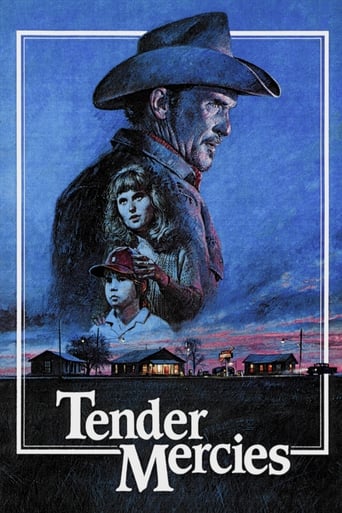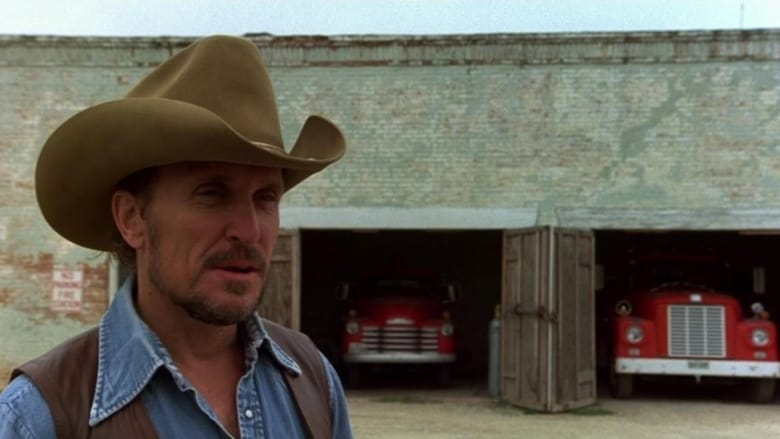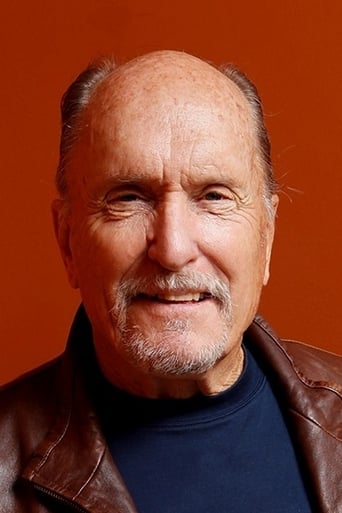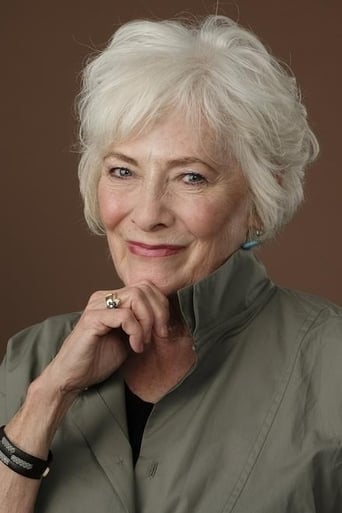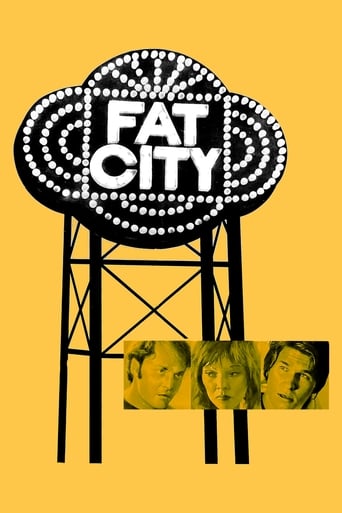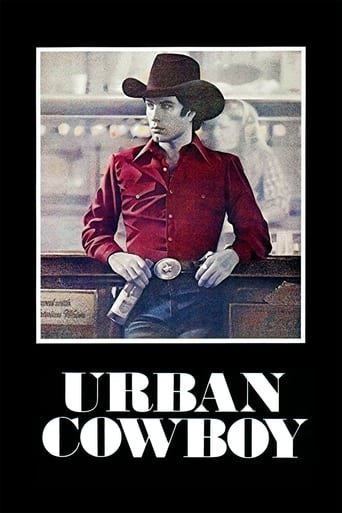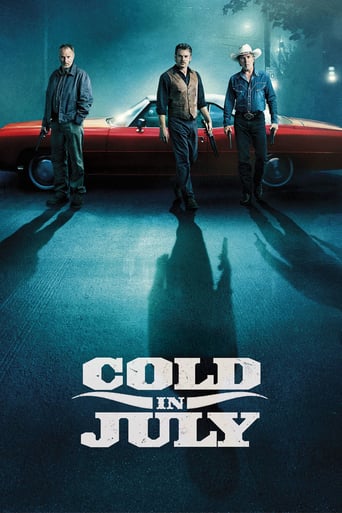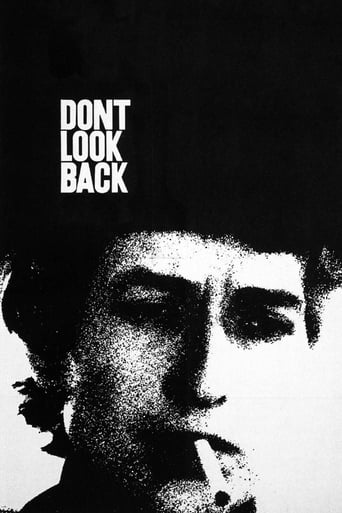Tender Mercies (1983)
Alchoholic former country singer Mac Sledge makes friends with a young widow and her son. The friendship enables him to find inspiration to resume his career.
Watch Trailer
Cast


Similar titles
Reviews
"Tender Mercies" is the story of a recovering alcoholic country singer who used to be famous once upon a time. He looks for a way to get his life back, and the story focuses on a certain period of his life. "Tender Mercies" is a drama film directed by Bruce Beresford and nominated for five Academy Awards including the Best Picture, and won 2 of them, Best Original Screenplay, Horton Foote, and Best Actor in a Leading Role, Robert Duvall. There are some films that focus only on one person. "Tender Mercies" is a splendid example of films like that. Robert Duvall's performance determines the success of the film. "Tender Mercies" has a very calm atmosphere. Nothing extreme or illogical happens. It is one of the films where you really believe in the story and the people in it. You accept the leading actor as one of your own. Sometimes you even get to ask yourself "why I watched this story?" "Tender Mercies" is like that. Maybe the story has nothing to do with you but it has everything to do with life. This is the main reason why it was nominated for five Academy Awards. The director is very much focused on the main character and ignores everything else. This creates a smooth and flowing progression for the story. The runtime of 92 minutes is very well calculated. This film is like the life itself. It is a part of life. You feel like nothing really happens, but eventually realize that a lot has changed around you. I think I can't describe "Tender Mercies" in a better way. Even though it is a drama, since it tells the story of a singer, you are going to hear a lot of beautiful country songs.Mac Sledge (Robert Duvall) was, once upon a time, famous country singer and song writer. He lost his family and career to alcohol. The film opens with a scene where he fights with a guy, in a remote hotel room, over a bottle of alcohol. Next day when he wakes up, he finds out that he doesn't have money to pay for his room. The owner of the motel, Rosa Lee, (Tess Harper) is a young widow who lost her husband in the Vietnam War and remained with her son Sonny (Allan Hubbard). Mac offers help for the motel to pay for his room. Rosa Lee agrees and he starts working there. After a couple of months, Mac recovers from alcohol and gets married to Rosa Lee.In a lot of scenes, we witness the inner screams of Mac. Rosa Lee and Sonny help him get back to his real self, and Mac proves to have a strong character. He starts to write music, he starts to sing again. He makes up with his daughter who dies in a car crash later on. There are a lot of scenes where he shows exceptional performances, but there is one particular scene which, I think, brings him the Oscar. This scene explains the unfairness of life and inner pains of Mac as well. I want to write a bit about this scene. Mac finds out about his daughter's death, he is in the garden, caring for vegetables and he tells his wife these exact words; "I don't know why I wandered out this part of Texas drunk, and you took me in and pitied me and helped me to straighten out, marry me. Why? Why did that happen? Is there a reason that happened? And Sonny's daddy died in the war, my daughter killed in an automobile accident. Why? See, I don't trust happiness. I never did; I never will." This scene is the whole summary of the film. This is exactly what I meant when I said; "Tender Mercies" is a part of real life. How many times I have asked related questions to myself. The justice has an unusual way of working, and it will never be truly understood. Mac has seen everything in his life, that's why he doesn't trust happiness. When you live long enough, survive long enough, you learn not to trust happiness. Because no one can hurt you anymore when you have no expectations. These feeling are the best examples of the reality of "Tender Mercies.""Tender Mercies" was made with a humble budget of $4.5 Million and grossed around $8.4 Million. These kinds of films don't have financial targets, they don't have big marketing campaigns. They are as silent as the characters in it. This is the beauty of "Tender Mercies." It is a notable example of the fact that you don't need a lot of money to make a good film. As for similarity, Randy Robinson, played by Mickey Rourke in The Wrestler, and, Bad Blake played by Jeff Bridges in the Crazy Heart, have similar inner struggles. Since these stories are directly about people, they will always have a respectful place in cinema.
Mac Sledge (Robert Duvall) is an alcoholic washed up country singer. He can't pay his motel bill and starts working for the widowed owner Rosa Lee (Tess Harper) who is raising her son Sonny. He turns his life around and they get marry. His new life is interrupted when a reporter drops by. His ex-wife Dixie Scott is a country music star and she's performing nearby. His story is printed in the newspaper. He goes to her concert and sees her manager Harry (Wilford Brimley). She angrily warns him not to see their daughter Sue Anne (Ellen Barkin).It's a powerful performance from Robert Duvall. That's the heart of the movie. He puts all of his skills to work. He's great when he's quiet. He's explosive when he needs to be. The camera work and the style could do more to add more substance to the material. It's a great showcase for Duvall and Tess Harper also gives a good performance.
"Tender Mercies" is a kind-hearted character study, but it doesn't have much in that vein to study. Everyone in the film, both the ones on screen and the ones who are simply allusions, is a perfect archetype. They are simple figures whose traits are summed up in no more than an adjective or two: an alcoholic country singer, a pious and patient widow, a glitzy but troubled Opry singer. To the film's credit, its shoe fits: the simplicity of the people is matched by a terseness of expression and a plain setting somewhere outside of Austin—not in one of that city's prettier Hill Country environs, either. The dialogue is especially direct in the case of the intensely personal questions that flow ceaselessly from a young boy to his widowed mother and stepfather. It's helpful, and rare for a serious drama which might be expected to strive for nuance and ambiguity, to know exactly what characters are thinking and feeling.The tradeoff is that what the characters think and feel is, to go back to this word, pretty simple. It's almost painfully uncomplicated, like a screenwriter's perception of what common, everyday folks' lives are like, but without being accidentally patronizing. The movie has no elitism, no detachment that could hint at superiority: it is warm and forgiving and non-judgmental to its characters, perhaps to a fault in the case of Robert Duvall's protagonist. The movie passes lightly over his history as a domestic abuser, a fact that might not be so uncomfortable if our knowledge of the women in his life were not so filtered through his eyes. One of the best scenes in the film takes place when he is away from home for a day and a night, and his wife and stepson are left to talk to each other. Most of the time, though, we see what he sees in pretty much the way he sees it. Could our perception of the Opry singer who was his ex-wife be limited to "glitzy but troubled" if we saw her in the long years of her single parenthood rather than in the emotionally-fraught circumstances that are the only intersections between her and Duvall's character? Similarly, his young adult daughter is written in a way that says more about him than her, and her arc seems to exist primarily to give him a reason to comment on his arc. She is the quintessential teen trying to grow up too fast in a manner that is thought to add depth to males but bring females to tragedy, just another example of moralistic fiction trope stretching back centuries.The plotting, then, is unsatisfying, and the characters too. The acting is capable, but it's nothing mold-breaking for Duvall, who nevertheless won an Oscar for it. A generation later, the movie "Crazy Heart" (2009, also featuring Duvall, but in a supporting role) would take the very same subject matter and throw in a few new twists and a couple of big, chewy, Oscary scenes that won its star Jeff Bridges the same award. The music alone is a sufficient reason to watch "Crazy Heart," which did for outlaw and alternative country what "O Brother, Where Art Thou?" (2000) did for American traditional folk. The music in "Tender Mercies" is also worth a listen, especially for fans of classic country in the Nashville and Bakersfield modes. The songs don't quite make it a must-see, but they are highlights of a pleasant enough hour and a half.
There's an scene in "Tender Mercies" that captures a small hotel, home, and gas station isolated in a desolate field. This image brings to light the underlying melancholy sense that carries along beneath the surface of the film. Bruce Beresford, who directed another of my favorite films, "Driving Miss Daisy", brings together just the sort of humanity that comes to the surface if only you'll let it. There are two great actors that I've been familiar with for most of my life at the center of this story. Robert Duvall and Tess Harper feel and act like real human beings. Imperfect, but not in a movie script way.The down-and-out country music star plot line has been done several times before and since. Most recently, in "Crazy Heart" (which also features Duvall, in a small role). But this is usually on a large scale, and music the larger focus. In other films, the singer goes from rags to riches (and often repeats the cycle a second time). In "Tender Mercies", the character of Mac Sledge has had a moderate level of success, some radio play, but will never play stadiums. He is merely seeking some minor return to form, to recapture what he loved doing. This provides some relief for those who, like myself, are not really country music fans. You don't get anything too far from the basic honesty of a man and his guitar. This isn't, after all, a glorified music video vehicle for an established country star - it's a quiet film about real people.The look and feel of "Tender Mercies" falls in close to what the title promises. Love, anger, joy, peace, even hate are represented in the understated way that a certain kind of people not commonly depicted on film express themselves. There's a humanity here in Horton Foote's writing. It's the exact kind of words that sound so natural from the mouths of the right actors. And this film has all the right ones. Wilford Brimley, one of my favorite character actors (also excellent in "Country" and "The Stone Boy") shows up briefly, as well as many others you might recognize from similar midwest dramas. "Tender Mercies is such a pure experience.

